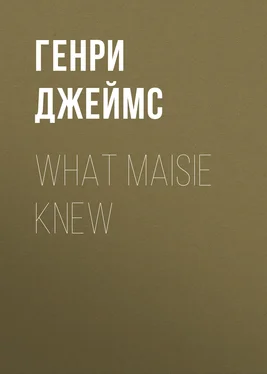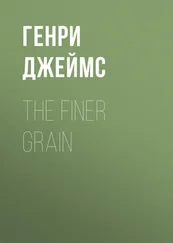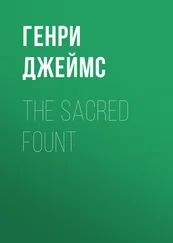Генри Джеймс - What Maisie Knew
Здесь есть возможность читать онлайн «Генри Джеймс - What Maisie Knew» — ознакомительный отрывок электронной книги совершенно бесплатно, а после прочтения отрывка купить полную версию. В некоторых случаях можно слушать аудио, скачать через торрент в формате fb2 и присутствует краткое содержание. Жанр: foreign_children, foreign_antique, foreign_prose, на английском языке. Описание произведения, (предисловие) а так же отзывы посетителей доступны на портале библиотеки ЛибКат.
- Название:What Maisie Knew
- Автор:
- Жанр:
- Год:неизвестен
- ISBN:нет данных
- Рейтинг книги:4 / 5. Голосов: 1
-
Избранное:Добавить в избранное
- Отзывы:
-
Ваша оценка:
- 80
- 1
- 2
- 3
- 4
- 5
What Maisie Knew: краткое содержание, описание и аннотация
Предлагаем к чтению аннотацию, описание, краткое содержание или предисловие (зависит от того, что написал сам автор книги «What Maisie Knew»). Если вы не нашли необходимую информацию о книге — напишите в комментариях, мы постараемся отыскать её.
What Maisie Knew — читать онлайн ознакомительный отрывок
Ниже представлен текст книги, разбитый по страницам. Система сохранения места последней прочитанной страницы, позволяет с удобством читать онлайн бесплатно книгу «What Maisie Knew», без необходимости каждый раз заново искать на чём Вы остановились. Поставьте закладку, и сможете в любой момент перейти на страницу, на которой закончили чтение.
Интервал:
Закладка:
"It may be, darling, that something will come. The objection, I must tell you, has been quite removed."
At this it was still more startling to hear Mrs. Wix speak out with great firmness. "I don't think, if you'll allow me to say so, that there's any arrangement by which the objection can be 'removed.' What has brought me here to-day is that I've a message for Maisie from dear Mrs. Farange."
The child's heart gave a great thump. "Oh mamma's come back?"
"Not yet, sweet love, but she's coming," said Mrs. Wix, "and she has—most thoughtfully, you know—sent me on to prepare you."
"To prepare her for what, pray?" asked Miss Overmore, whose first smoothness began, with this news, to be ruffled.
Mrs. Wix quietly applied her straighteners to Miss Overmore's flushed beauty. "Well, miss, for a very important communication."
"Can't dear Mrs. Farange, as you so oddly call her, make her communications directly? Can't she take the trouble to write to her only daughter?" the younger lady demanded. "Maisie herself will tell you that it's months and months since she has had so much as a word from her."
"Oh but I've written to mamma!" cried the child as if this would do quite as well.
"That makes her treatment of you all the greater scandal," the governess in possession promptly declared.
"Mrs. Farange is too well aware," said Mrs. Wix with sustained spirit, "of what becomes of her letters in this house."
Maisie's sense of fairness hereupon interposed for her visitor. "You know, Miss Overmore, that papa doesn't like everything of mamma's."
"No one likes, my dear, to be made the subject of such language as your mother's letters contain. They were not fit for the innocent child to see," Miss Overmore observed to Mrs. Wix.
"Then I don't know what you complain of, and she's better without them. It serves every purpose that I'm in Mrs. Farange's confidence."
Miss Overmore gave a scornful laugh. "Then you must be mixed up with some extraordinary proceedings!"
"None so extraordinary," cried Mrs. Wix, turning very pale, "as to say horrible things about the mother to the face of the helpless daughter!"
"Things not a bit more horrible, I think," Miss Overmore returned, "than those you, madam, appear to have come here to say about the father!"
Mrs. Wix looked for a moment hard at Maisie, and then, turning again to this witness, spoke with a trembling voice. "I came to say nothing about him, and you must excuse Mrs. Farange and me if we're not so above all reproach as the companion of his travels."
The young woman thus described stared at the apparent breadth of the description—she needed a moment to take it in. Maisie, however, gazing solemnly from one of the disputants to the other, noted that her answer, when it came, perched upon smiling lips. "It will do quite as well, no doubt, if you come up to the requirements of the companion of Mrs. Farange's!"
Mrs. Wix broke into a queer laugh; it sounded to Maisie an unsuccessful imitation of a neigh. "That's just what I'm here to make known—how perfectly the poor lady comes up to them herself." She held up her head at the child. "You must take your mamma's message, Maisie, and you must feel that her wishing me to come to you with it this way is a great proof of interest and affection. She sends you her particular love and announces to you that she's engaged to be married to Sir Claude."
"Sir Claude?" Maisie wonderingly echoed. But while Mrs. Wix explained that this gentleman was a dear friend of Mrs. Farange's, who had been of great assistance to her in getting to Florence and in making herself comfortable there for the winter, she was not too violently shaken to perceive her old friend's enjoyment of the effect of this news on Miss Overmore. That young lady opened her eyes very wide; she immediately remarked that Mrs. Farange's marriage would of course put an end to any further pretension to take her daughter back. Mrs. Wix enquired with astonishment why it should do anything of the sort, and Miss Overmore gave as an instant reason that it was clearly but another dodge in a system of dodges. She wanted to get out of the bargain: why else had she now left Maisie on her father's hands weeks and weeks beyond the time about which she had originally made such a fuss? It was vain for Mrs. Wix to represent—as she speciously proceeded to do—that all this time would be made up as soon as Mrs. Farange returned: she, Miss Overmore, knew nothing, thank heaven, about her confederate, but was very sure any person capable of forming that sort of relation with the lady in Florence would easily agree to object to the presence in his house of the fruit of a union that his dignity must ignore. It was a game like another, and Mrs. Wix's visit was clearly the first move in it. Maisie found in this exchange of asperities a fresh incitement to the unformulated fatalism in which her sense of her own career had long since taken refuge; and it was the beginning for her of a deeper prevision that, in spite of Miss Overmore's brilliancy and Mrs. Wix's passion, she should live to see a change in the nature of the struggle she appeared to have come into the world to produce. It would still be essentially a struggle, but its object would now be not to receive her.
Mrs. Wix, after Miss Overmore's last demonstration, addressed herself wholly to the little girl, and, drawing from the pocket of her dingy old pelisse a small flat parcel, removed its envelope and wished to know if that looked like a gentleman who wouldn't be nice to everybody—let alone to a person he would be so sure to find so nice. Mrs. Farange, in the candour of new-found happiness, had enclosed a "cabinet" photograph of Sir Claude, and Maisie lost herself in admiration of the fair smooth face, the regular features, the kind eyes, the amiable air, the general glossiness and smartness of her prospective stepfather—only vaguely puzzled to suppose herself now with two fathers at once. Her researches had hitherto indicated that to incur a second parent of the same sex you had usually to lose the first. " Isn't he sympathetic?" asked Mrs. Wix, who had clearly, on the strength of his charming portrait, made up her mind that Sir Claude promised her a future. "You can see, I hope," she added with much expression, "that he's a perfect gentleman!" Maisie had never before heard the word "sympathetic" applied to anybody's face; she heard it with pleasure and from that moment it agreeably remained with her. She testified moreover to the force of her own perception in a small soft sigh of response to the pleasant eyes that seemed to seek her acquaintance, to speak to her directly. "He's quite lovely!" she declared to Mrs. Wix. Then eagerly, irrepressibly, as she still held the photograph and Sir Claude continued to fraternise, "Oh can't I keep it?" she broke out. No sooner had she done so than she looked up from it at Miss Overmore: this was with the sudden instinct of appealing to the authority that had long ago impressed on her that she mustn't ask for things. Miss Overmore, to her surprise, looked distant and rather odd, hesitating and giving her time to turn again to Mrs. Wix. Then Maisie saw that lady's long face lengthen; it was stricken and almost scared, as if her young friend really expected more of her than she had to give. The photograph was a possession that, direly denuded, she clung to, and there was a momentary struggle between her fond clutch of it and her capability of every sacrifice for her precarious pupil. With the acuteness of her years, however, Maisie saw that her own avidity would triumph, and she held out the picture to Miss Overmore as if she were quite proud of her mother. "Isn't he just lovely?" she demanded while poor Mrs. Wix hungrily wavered, her straighteners largely covering it and her pelisse gathered about her with an intensity that strained its ancient seams.
Читать дальшеИнтервал:
Закладка:
Похожие книги на «What Maisie Knew»
Представляем Вашему вниманию похожие книги на «What Maisie Knew» списком для выбора. Мы отобрали схожую по названию и смыслу литературу в надежде предоставить читателям больше вариантов отыскать новые, интересные, ещё непрочитанные произведения.
Обсуждение, отзывы о книге «What Maisie Knew» и просто собственные мнения читателей. Оставьте ваши комментарии, напишите, что Вы думаете о произведении, его смысле или главных героях. Укажите что конкретно понравилось, а что нет, и почему Вы так считаете.












